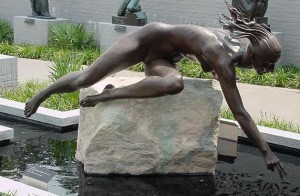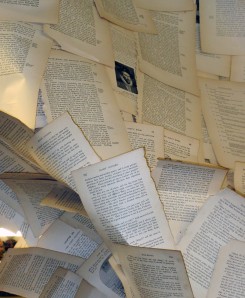 I put Sylvia Plath’s quote, “The worst enemy to creativity is self doubt,” on the bottom of my computer screen the other day. In my last post, I briefly discussed the truth of her statement. I also talked about how a writer must have conviction, must move beyond the internal critic. One thing to write it, another thing to do it.
I put Sylvia Plath’s quote, “The worst enemy to creativity is self doubt,” on the bottom of my computer screen the other day. In my last post, I briefly discussed the truth of her statement. I also talked about how a writer must have conviction, must move beyond the internal critic. One thing to write it, another thing to do it.
The road block of self doubt holds me back as a writer more often than not. Self doubt is the reason my novel is not yet finished. I am often paralyzed by my self doubt, to the point where I can think of 9,000 other things I’d rather do than write. After all, if nothing I write is worthwhile, if every word I put down is useless, then why bother? Even as I am writing this blog post, I am doubting the value of these words. Didn’t I already post several posts about all this, I’m thinking as I write now. Why write another post about the angst of writing?
Being a closet writer for practically forever is due to my lack of faith in myself. I generally believe that I am a lousy writer. I hold this belief in spite of being told by many that the opposite is true. Actually, there were only two people in my life that ever told me I couldn’t write and they were both lawyers. But, that’s an entirely different story.
Since I posted my blog comments on Plath’s statement, I have thought considerably about her words. As I was writing this week, I found myself consciously attempting to move beyond my self-doubt and write without considering whether what I wrote was acceptable, good enough, lousy, or brilliant. I decided not to think about if the writing that flowed from my brain connected to the pages I already have. I didn’t care if the writing made any sense. I decided I would write with confidence, that I would write as if I already had an audience for the book. That people will want to read it. That it has value. The result was pretty amazing. I was not only able to write more without stopping to criticize it or edit it, but I was more focused. The writing flowed much better without my internal editor at work.
If only I could sustain this process of ignoring the constant nagging voice that screams at me that I’m not good enough. The negative voice inside my head that is a constant companion exhausts me, makes me feel inadequate. I end up paralyzed at my desk, looking at the blank computer screen with no ability to produce words. So, I read over what I have already managed to write and engage in editing from the perspective that everything I’ve already written needs to be trashed. I tell myself I am a fraud—I tell myself I’m wasting my time. I tell myself that no one will care what I have to say. I tell myself I already have proof that this is the case. After all, I tell myself, if I can’t even get my family to read anything I’ve written, then no one else will, either. Perhaps the reality is that it is actually better that family hasn’t read my novel-in-progress. Rumor has it that family can be crueler than anyone else, so having one’s novel critiqued by them may be the worst idea yet.
In any event, my goal this month, despite all sorts of major interruptions, is to do my best to ignore this internal editor, this doubter, and write, write, write, write. Until. The. First. Draft. Is. Finished. This requires creativity, confidence, and conviction. I must have the creativity to continue writing the story, the confidence to believe in what I am writing, and the conviction to do the work it takes to finish.
Even now Mr. Doubting Thomas within me is telling me I don’t stand a chance.

